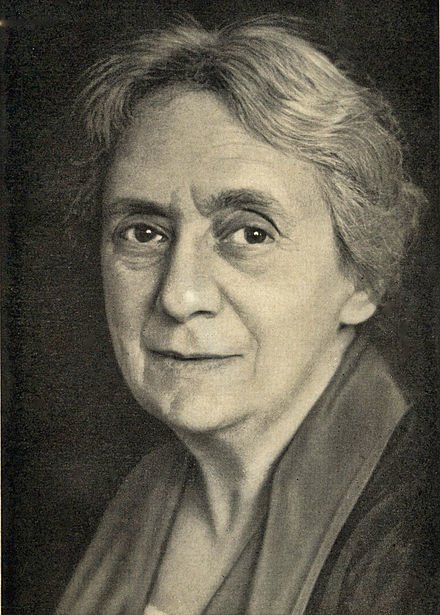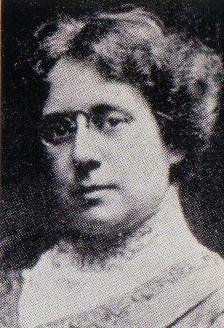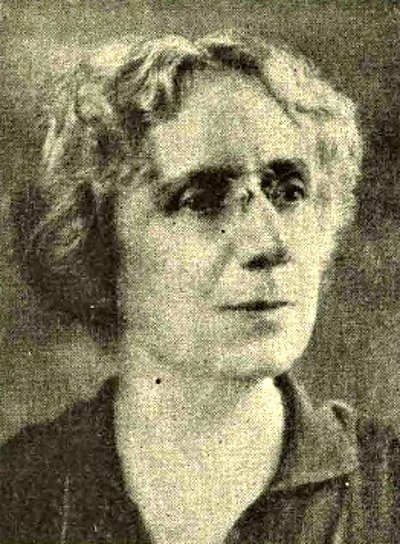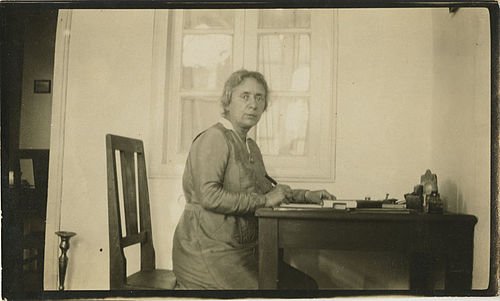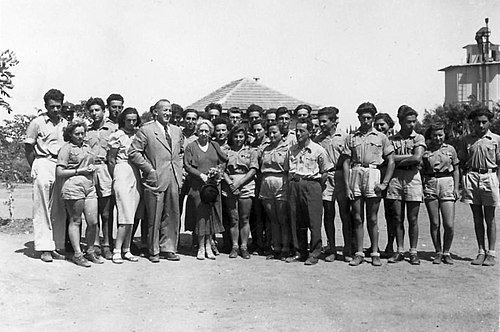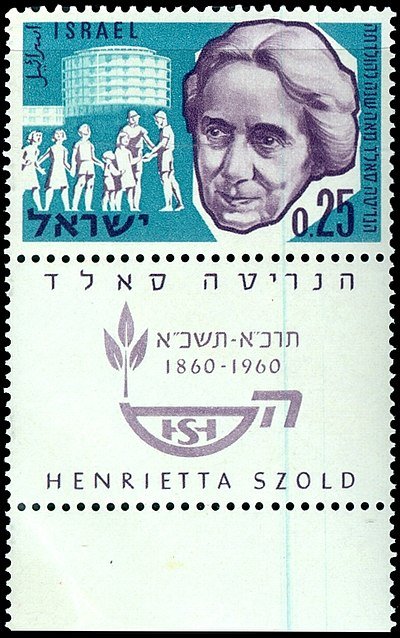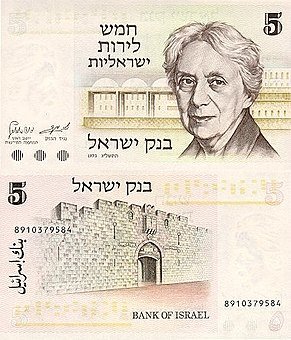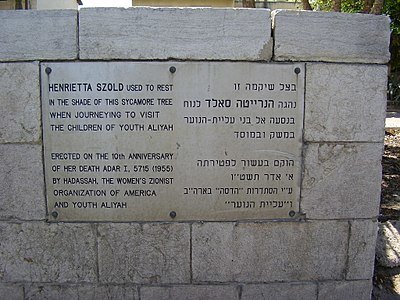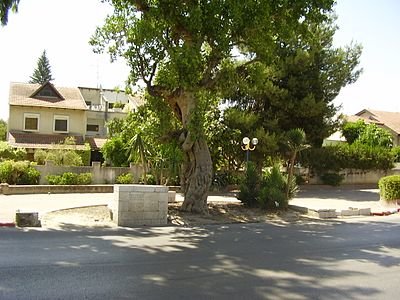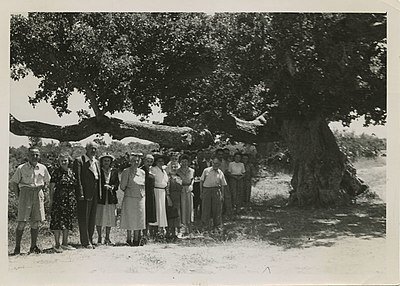Henrietta Szold: A Life Dedicated to Zionism and Education
Henrietta Szold's life and work were marked by a deep commitment to Zionism, education, and the welfare of the Jewish people. From her early days as a teacher in Baltimore to her leadership in organizations like Hadassah and Youth Aliyah, she made lasting contributions to the Jewish community and the State of Israel. Her legacy continues to inspire people around the world to work for social justice, education, and the well-being of others. Szold's dedication to her ideals and her tireless efforts on behalf of those in need serve as a powerful example of the positive impact that one person can have on the world.
Henrietta Szold, also known as Henrietta Szold, was born on December 21, 1860, in Baltimore, Maryland, USA. She was a prominent public figure, educator, and literary editor who devoted her life and work to the Zionist cause and the Jewish people.
Szold was active in various fields, including assisting Jewish refugees in the United States, education, social work, and healthcare. She played a pivotal role in founding the Hadassah organization and leading the Youth Aliyah movement. She established, appointed, and managed various institutions and organizations in Israel to support children and youth. She is considered one of the central figures associated with the public work of women in the 20th century.
Biography
Henrietta Szold was born to Sophie Schaar and Rabbi Benjamin Szold, who had been ordained as a rabbi in Hungary. After her parents' marriage, her father was invited to serve as a rabbi in the Jewish community of Baltimore. A year after their arrival in the United States, Henrietta, their first child, was born. In total, the couple had eight daughters, three of whom passed away at a young age.
The Szold family immigrated to the United States before the major wave of Eastern European Jewish immigration, which allowed them to settle and establish themselves relatively comfortably.
Her father, Rabbi Benjamin Szold, played a dominant and highly influential role in Henrietta's life. Their close relationship, shared studies, his writings, and intellectual discussions on various topics significantly shaped her views, independent thoughts, and value system, which later found expression in her multifaceted activities throughout her life.
In her youth, Szold helped her mother with household tasks and took care of her younger sisters, even nursing them when they fell ill. When her youngest sister, Adele, became ill and eventually passed away, Henrietta herself fell ill.
This tragedy left Henrietta without consolation for the rest of her life. She took her younger sisters on numerous nature walks to acquaint them with local plant life, and in this field as well, Szold acquired extensive knowledge throughout her leisure hours, becoming well-versed in plant taxonomy, including their families and medicinal properties.
Henrietta had a deep love for history in her youth and independently studied the subject, often seen engrossed in her books while sitting in the small garden outside her home after finishing her studies at the Jewish school she attended. Encouraged by her father, she transitioned to a local general high school called the "Western Female High School," which was not exclusively for Jewish students.
She graduated with honors and became the only and first Jewish girl from her community to attend such an institution. Alongside her high school studies, she taught Bible, Hebrew, and Jewish history in the religious studio within her father's synagogue.
Upon completing her studies in 1877, as women were not allowed to enroll in higher education institutions at the time, Henrietta, at the age of sixteen, became a teacher of languages and mathematics at the "Private School for Jewish Girls of the Misses Adams," where she taught for fifteen consecutive years. Later, Szold reflected that if she were a man, she could have achieved more.
Involvement in Zionism
In 1881, Henrietta began to explore her family's roots and was exposed to various Jewish communities in Europe and their hardships during her father's journey to his birthplace, which took him through Central Europe, a journey she accompanied him on. "The Russian storms" was the term used in the Hebrew press in Russia to describe the pogroms that began in April 1881 and continued until May 1882, targeting Jews in the southwestern part of the Russian Empire, primarily in what is now Ukraine.
The refugees from the pogroms arrived in great numbers on the shores of America, bringing with them tales of Jewish persecution and a feeling that a solution to the Jewish question must be found. Henrietta, who was already twenty years old, and her father used to go to the harbor to greet the newcomers.
Rabbi Benjamin Szold, proficient in many languages, served as an interpreter for the new immigrants and even invited them to their home. It was during this time that Henrietta first heard about a pamphlet written by Yehuda Leib Pinsker titled "Auto-Emancipation" and various discussions on the fate of the Jewish people that extended into the night with the immigrants in their home.
"I became a Zionist from the moment I felt that Zionism provides my wounded, torn, and bleeding people, who are hated by everyone, an ideal that can encompass everything, without paying attention to the various and conflicting approaches to other Jewish issues" (referring to religion, reform, socialism, and the like).
After her hours as a schoolteacher, Henrietta founded an evening school called the "Association of Jewish Intellectuals" in the attic of her parents' home. There, she taught English to immigrants, helping them integrate into American and Jewish society during that period and familiarizing them with life in the new continent, instilling in them a sense of pride in their new homeland, which offered opportunities for a fresh start. In a letter she wrote during that time, she described herself as "devoted entirely to the immigrants in my spare time."
Henrietta Szold regularly contributed articles to the Jewish Messenger under the pseudonym "Shulamith." In her "Baltimore Letters," she wrote about the problems faced by Jews in America based on her observations of life in her community and encounters with immigrants. She described the challenges of making a living, giving up Sabbath observance, and other commandments to survive and the remnants of assimilation. She urged American Jews, whom she called the "veterans," to find a solution to assimilation, revive the Hebrew language, and emphasize the importance of Jews having their own homeland.
Early Zionist Activities
In 1893, Szold volunteered for the Jewish Publication Society, and in 1895, at the age of 33, she was appointed as the organization's salaried secretary, although she never received any compensation for her extensive work. Her role in practice was the chief editor of the publications. Initially, she worked at the society's headquarters in Philadelphia.
However, when her father fell ill, she returned to Baltimore in 1895 and continued her work from her parents' home. She also taught in the evenings at the "Jewish Seminary," where she instructed students in Bible, Hebrew, and Jewish history.
After seven years of severe illness, during which she traveled multiple times to care for her father in his sickness, Rabbi Benjamin Szold passed away in 1902. Her mother, Sophia, left Baltimore and moved to New York with her daughter. The new home became a center for educated Jewish women who engaged in various ways to promote Zionism and the cause of Eretz-Israel. This group was known as the "Daughters of Zion."
In 1904, Henrietta Szold began studying at the Jewish Theological Seminary (JTS), a conservative rabbinical school. She was admitted under the condition that she declare she had no intention of pursuing rabbinic ordination upon completing her studies. She became the first woman to study there.
At JTS, Szold met Professor Louis Ginzberg, who was thirteen years her junior. They collaborated extensively on his work "Legends of the Jews" and engaged in numerous intellectual discussions during their work. They developed a deep friendship that lasted throughout their lives. Ginzberg later wrote of their relationship: "I can say that I have been her friend for forty years and that I have never met anyone else like her."
At the seminary, Szold also met Horace Kallen, a philosophy student and educator who influenced her ideas on Zionism and Americanism. She was inspired by Kallen's philosophy, which encouraged cultural pluralism, and she saw parallels between his ideas and the Zionist movement. Szold began to advocate for a vision of Zionism that was not just about establishing a Jewish homeland in Palestine but also about preserving Jewish culture and identity in the diaspora.
In 1907, Szold attended the Second Zionist Congress in Basel, Switzerland, where she met Theodor Herzl, the founder of modern political Zionism. She was deeply influenced by Herzl's vision and became an active participant in the Zionist movement. After returning to the United States, she organized and led a series of lectures on Zionism and began working to promote the Zionist cause among American Jews.
Hadassah
In 1912, Henrietta Szold played a central role in the founding of Hadassah, the Women's Zionist Organization of America. The organization was established with the goal of providing medical services in Palestine (then part of the Ottoman Empire) and promoting Zionist education and youth activities in the United States. Szold served as the organization's first president and was instrumental in raising funds and support for its activities.
One of Hadassah's most significant achievements was the establishment of the Hadassah Medical Organization, which included the opening of the Hadassah Hospital in Jerusalem. Szold played a crucial role in these efforts, and her dedication to healthcare in Palestine helped transform medical services in the region.
Youth Aliyah and Immigration to Palestine
In the 1930s, as the situation for Jews in Europe deteriorated, Henrietta Szold became deeply concerned about the fate of Jewish children who were fleeing persecution. She established the Youth Aliyah movement, which aimed to rescue Jewish children from Europe and bring them to Palestine. Under her leadership, thousands of Jewish children were saved from the Holocaust and given the opportunity to start new lives in Palestine.
In 1933, Szold moved to Jerusalem, where she continued her work on behalf of the Jewish people and played a significant role in shaping the educational and social welfare systems in Palestine.
Later Years and Legacy
Henrietta Szold continued her activism and leadership in various Zionist and humanitarian causes until her death in 1945. She is remembered as a tireless advocate for the Jewish people, a champion of education, and a pioneer in the field of healthcare in Palestine. Her legacy lives on through organizations like Hadassah and the Youth Aliyah movement, which continue to make significant contributions to Israeli society.
Szold's life and work continue to inspire generations of Jewish women and men to be actively engaged in the Zionist movement and to work for the betterment of the Jewish people and the world.
Quotes
Here are some notable quotes attributed to Henrietta Szold:
1. "A good cause can become bad if we fight for it with means that are indiscriminately murderous. A bad cause can become good if enough people fight for it in a spirit of comradeship and self-sacrifice. In the end, it is how you fight, as much as why you fight, that makes your cause good or bad."
2. "I want to be a propagandist for the cause, and what concerns me most is that people should understand the question; for as soon as they do they will certainly decide in favor of it."
3. "You have it in your power to be an excellent citizen and a true and patriotic American, a worthy model of your religion and an unswerving follower of the flag that guarantees you full religious and civil liberty."
4. "In a very real sense, we are made up of all the experiences of our ancestors. The personal life and the collective life are interwoven, and from them comes the civilization in which we live."
5. "If I feel physically as if the top of my head were taken off, I know that is poetry."
6. "My greatest strength is the love for my people, my greatest weakness is that I love them too much."
7. "You will do good in the world if you are but willing to believe that the best way of serving God is by caring for His helpless children."
8. "You do not have to be eloquent in your appeal for your cause; you have to be humble in the face of it."
9. "The most wonderful gift one friend can give another is a glimpse of God's goodness."
- הנרייטה סאלדhe.wikipedia.org
